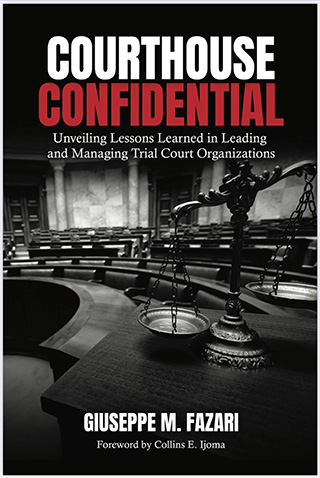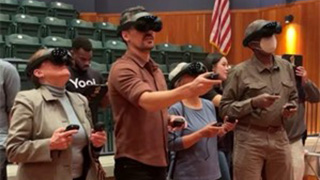Criminal Justice Professor Publishes New Book, Courthouse Confidential
Friday, October 21, 2022

Launched in Dubai this past summer as part of a judicial externship program in which Fazari served as lead facilitator and subject matter expert for 40 judges, the book distills many of the processes and insights for which Fazari is widely published for and highly sought as a judicial and court system consultant.
The curriculum for the Dubai program focused on the foundations and fundamentals of caseflow management. Apart from being at the center of Fazari's model, caseflow management is critical to the purposes and responsibilities of the courts and can lead to greater public support for the judiciary by improving the quality of justice. Fazari has been engaged to teach this curriculum, among other components of the paradigm, to judges and court officials throughout the world – and, of course, to students at Seton Hall.
A subject-matter expert in the field of court administration, Fazari's consultation and professional work experience in the field spans five continents, as well as several states throughout the United States. Most recently, he was reengaged by the American Bar Association's Rule of Law Initiative at the Rodrigo Lara Bonilla Judicial Training School in Colombia. Fazari was tasked to co-facilitate a series of five seminars in the areas of Leadership, Ethics, Implicit Bias, Procedural Fairness, and Court Technology.
Prior to that, he co-facilitated a presentation entitled, "How Ebola Prepared a Judiciary at the Epicenter of Covid-19," that launched the National Association for Court Management annual conference held in San Diego, California and was based on a continuity of operations plan that he oversaw while working as chief of court operations in the New Jersey Judiciary.

According to the publisher,
Courthouse Confidential provides a groundbreaking approach to the study of management and leadership in a justice environment. Through a variety of case studies drawn from the author's professional experiences which he creatively blends with an extensive review of the literature, it coalesces the practical and intellectual, so that it is relevant, timely, and most importantly actionable. Centered on an empirically based paradigm around 10 core elements of court administration including court culture, leadership, strategic management and long-term planning, community engagement, stakeholder collaboration, human resources management and consultation, information technology management, operations management, funding and budget management, and caseflow management, this book is a primer for academics, administrators, and judges in the study and practice of leading and managing the trial courts.
An extensive review of the text was done from the leading experts and practitioners in field including José Octavio Guillén, Court Executive Officer, State of California (Ret.) and International Court Administration Consultant, who noted:
This book provides a comprehensive career development pathway by clearly describing the principles, theories, concepts, and competencies court leaders need to know to be effective.
Marcus W. Reinkensmeyer, Deputy Director, Administrative Office of the Courts, Arizona Court Administrator, Superior Court of Arizona, Maricopa County (Ret.), remarked:
As the field of court administration expands, so too does our need for practical application of organizational theory in the justice system. This pressing need is squarely met in Dr. Fazari's timely and insightful book. Case studies drawn from his experiences explore the complex dynamics of court leadership, strategic planning and executive level working relations.
Dominic J. Rossi, Esq., Deputy Court Administrator First Judicial District of Pennsylvania (Ret.) and Past President, Pennsylvania Association of Court Management, commented:
Drawing upon his vast experience as a trial court administrator in urban judicial districts, Dr. Fazari explores the importance of leadership in the management of state courts. His case studies illustrate the risks incurred by a court which implements projects contrary to the recommendation of experts and ignores the relevant data and interplay between local judicial officials and statewide counterparts or proceeds without the input and cooperation of necessary staff. I would recommend the book to not only newly hired court employees, but also seasoned managers.
Professor Fazari is teaching Victimology, Criminal Justice Complex, Criminal Courts, and Fundamentals of the Courts this year at Seton Hall. He is also slated to teach a newly developed course that will be offered next semester, Comparative Justice Systems, which includes a study abroad segment in Bogota, Colombia. Courthouse Confidential is his second book and follows the 2019 publication by Rowman & Littlefield, Historical Dictionary of American Criminal Justice.
Categories: Arts and Culture, Nation and World





